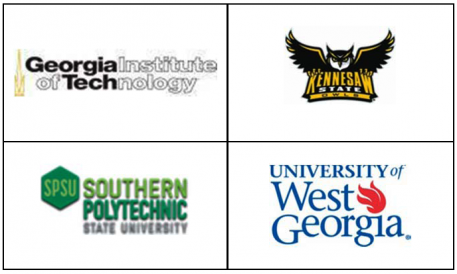Article Posted December 06, 2012

Presidents Panel Discussion - Georgia 2012 Conference for College and University Auditors

The Georgia 2012 Conference for College and University Auditors, held July 30 and 31, was attended by more than 80 higher education audit and finance professionals from across the southeast. Of the many highlights of the conference was the Presidents Panel discussion, featuring four USG Presidents:
• Dr. Lisa Rossbacher, Southern Polytechnic State University,
• Dr. "Bud" Peterson, Georgia Institute of Technology,
• Dr. Beheruz N. Sethna, the University of West Georgia, and
• Dr. Daniel S. Papp, Kennesaw State University.
The panel discussion provided attendees with the rare opportunity to hear from and ask questions of several University Presidents in a group setting. The topic of discussion was “Setting the Tone at the Top – The Importance of the Internal Audit Function as a Management Tool”. Moderated by USG Chief Audit Officer and Associate Vice Chancellor John Fuchko, the Presidents provided their thoughts on the significance of the internal audit function as a key management tool, and how the internal audit function contributes to improvements in the Governance, Risk Management, Compliance, and Internal Controls (GRCC) model. Below are several question and answer segments featured as part of the panel’s discussion.
Describe your management style, and how it incorporates the audit and compliance functions?
Each of the Presidents expressed positive attributes about their internal audit function, and about building a relationship of trust and openness. They emphasized the need to hear the “bad news” prior to the full impact of an emerging issue. Dr. Rossbacher discussed ways in which sensitive subjects may be broached, but again stressed the need to not bring the bad news “too late.” Dr. Peterson’s indicated one of his objectives as President is to create a culture where staff can bring the bad news and openly express their concerns as well as solutions to leadership.
What are the most important characteristics of a high functioning audit organization, and what do you look for in terms of staff strengths, skills, and competencies?
The Presidents discussed attributes of excellence: trustworthiness, intelligence, collaboration, strong communication skills, competency, and technical proficiency. Two characteristics topping the list were integrity and confidentiality. Dr. Sethna included good managerial skills along with disclosing the right information at the right time. Dr. Rossbacher shared the “canary in the coal mine” metaphor; in that an effective auditor should be the first person who alarms the institution of potential risks and effective mitigation strategies. Dr. Papp described the intellectual attributes an audit or finance professional should possess, including social intelligence(1), stating that to be successful, auditors need to possess social skills that would engender trust and confidence with their colleagues. Dr. Papp mentioned many of these views are similarly voiced in Stephen M.R. Covey, Jr.’s, The Speed of Trust, which outlines 5 different types of trust and how an environment of trust helps all parties function more efficiently.
What are some of the most significant management and governance issues affecting the USG?
Dr. Rossbacher shared her thoughts on institutional accountability, and balancing internal audit’s accountability to the governing Board while also recognizing them as “part of the team. Dr. Peterson discussed managing the expectations of the internal audit function, assigning staff to where there is value added, and working with the individuals to develop processes for compliance and control. Another area of concern was shared by Dr. Papp, in that dwindling funding and austerity programs continue to challenge institutions, saying that if an institution has good people in a bad system, the system will struggle along, but function; conversely, if there are bad people, even in a good system, the system will break. Dr. Rossbacher agreed and added that people facing increasing economic pressure can be pushed beyond the boundaries of their typical behavior.
Dr. Sethna expressed that increased compliance and monitoring are the great challenges of the future. He reflected on Deming’s fourteen points of quality management, which focus on consistency, continuity, pride of workmanship, and identifying the point of origin when an error is detected(2).
What words of wisdom should be shared with the auditors?
The Presidents responded largely in agreement, stating the takeaway from this discussion and situations such as the issues at Penn State is that bad decision making creates a culture in an organization of apathy. People become dissuaded from the truth due to fear of reprisal or the belief that nothing will be done. Dr. Sethna emphasized the value of Hotline reporting and the value offered by its anonymity. His preference is for people to use the chain of command within the organization, but finds great value in resources such as these. In addition, he cited the value of the dual reporting relationship with the Chief Auditor and the Presidents, which provides safety and value to the auditor. Dr. Rossbacher encouraged the audience to utilize the ERM process to identify and institutional risks. Dr. Peterson offered that creating partnership with the institutions to foster collegial relationships and to bridge communication to anticipate issues should remain a priority. These relationships have the potential to ward off problems down the road. Dr. Papp shared his thoughts on governance as a four part system, to include relationships between auditors and Presidents, auditors and the cabinet, auditors and administrators, and auditors and the USG system office.
___________________________________________
(1) Writings by Harvard Professor Dr. Howard Gardner (MI), Dr. Daniel Goleman (EI) and, Karl Albrecht (SI),
(2) William Edward Deming, 1900 - 1993, The Deming System of Profound Knowledge; credited with concepts of Total Quality Management
Posted by OIAC
Published in: Audit Programs
Most Recent in: Audit Programs
There are no other stories in this categoryView Articles by Category
Search
Contact
Internal Audit & Compliance
Board of Regents of the University System of Georgia
270 Washington Street, SW
Atlanta, GA 30334
Tel.: 404-962-3020
Fax: 404-962-3033
Email: .(JavaScript must be enabled to view this email address)

